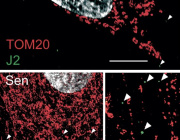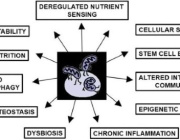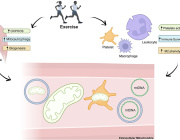Mitochondria behind blood cell formation
New Northwestern Medicine research published in Nature Cell Biology has shown that mitochondria, traditionally known for their role creating energy in cells, also play an important role in hematopoiesis, the body's process for creating new blood cells."Historically, mitochondria are viewed as ATP—energy—producing organelles," explained principal investigator Navdeep Chandel, PhD, the David W. Cugell Professor of Medicine in the Division of Pulmonary and Critical Care Medicine. "Previously, my laboratory provided evidence that mitochondria can dictate cell function or fate independent of ATP production. We established the idea that mitochondria are signaling organelles."In the current study, Chandel's team, including post-doctoral fellow Elena Ansó, PhD, and graduate students Sam Weinberg and Lauren Diebold, demonstrated that mitochondria control hematopoietic stem cell fate by preventing the generation of a metabolite called 2-hydroxyglutarate (2HG). The scientists showed that mice with stem cells deficient in mitochondrial function cannot generate blood cells due to elevated levels of 2HG, which causes histone and DNA hyper-methylation."This is a great example of two laboratories complementing their expertise to work on a project," said Chandel, also a professor of Cell and Molecular Biology and a member of the Robert H. Lurie Comprehensive Cancer Center of Northwestern University.Paul Schumacker, PhD, professor of Pediatrics, Cell and Molecular Biology and Medicine, was also a co-author on the paper.Chandel co-authored an accompanying paper in Nature Cell Biology, led by Jian Xu, PhD, at the University of Texas Southwestern Medical Center, which demonstrated that initiation of erythropoiesis, the production of red blood cells specifically, requires functional mitochondria."These two studies collectively support the idea that metabolism dictates stem cell fate, which is a rapidly evolving subject matter," said Chandel, who recently wrote a review in Nature Cell Biology highlighting this idea. "An important implication of this work is that diseases linked to mitochondrial dysfunction like neurodegeneration or normal aging process might be due to elevation in metabolites like 2HG."
Read more at: https://phys.org/news/2017-06-mitochondria-blood-cell-formation.html#






























































